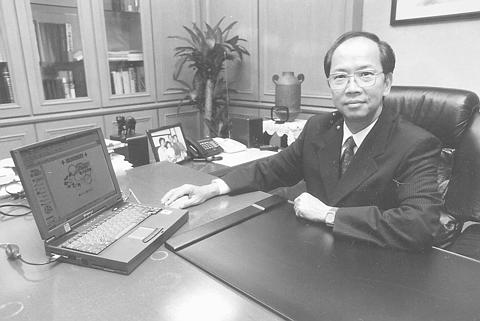His resignation as chairman of the Council of Agriculture (COA) may be the last-stand in politics for Peng Tso-kwei (
Telling reporters yesterday that he was "fed up" with politics, Peng leaves a legacy of relatively idealistic policy-making and a pragmatic approach rare at the highest levels of government.
His background -- both as an academic and a government official -- could well have influenced this approach.

FILE PHOTO
As a student at National Chunghsing University, Peng Tso-kwei was a determined and aggressive player on the sports field.
His 110-meter hurdle record remains unbeaten at Chunghsing University, and he once referred to taking up the post at the COA as an obstacle race, which requires extra strength and patience.
His venture into the political arena from the academic field was something unexpected.
Four days before the Cabinet reshuffle in 1997, Peng was given 40 minutes to make a decision that would change his life.
He decided to take a chance and become COA chairman, although the decision was later not supported by his own family.
Soon after taking up his new post, Peng established three major policy directions for the field of agriculture: production (
He said he believed that agricultural production had to be modernized to be effective, that agricultural trading liberalization was a must, and that farmers' benefits had to be well taken care of in the event of natural disasters.
Peng pushed for building resort-like farm villages, preserving endangered animals, and opposing the over-development of mountainous areas and logging.
He also suggested taking better care of older farmers, since they had contributed so much to the development of agriculture, and to respect younger farmers in order to encourage more young people to join the farming business, which has seen a rapid decline in recent years.
He also proposed adopting compensation measures to take care of farmers' losses if their rights were violated.
Peng had proposed that agricultural policy should pay attention not only to producers, but also to consumers. Peng had made it a goal to ensure that the government provided consumers with safe, quality, diverse, and hygienic agricultural products.
As for the management of farmland, Peng had proposed liberalizing the agricultural land market, to allow non-farmers to buy farm land to help the development of the industrial sector.

A Ministry of Foreign Affairs official yesterday said that a delegation that visited China for an APEC meeting did not receive any kind of treatment that downgraded Taiwan’s sovereignty. Department of International Organizations Director-General Jonathan Sun (孫儉元) said that he and a group of ministry officials visited Shenzhen, China, to attend the APEC Informal Senior Officials’ Meeting last month. The trip went “smoothly and safely” for all Taiwanese delegates, as the Chinese side arranged the trip in accordance with long-standing practices, Sun said at the ministry’s weekly briefing. The Taiwanese group did not encounter any political suppression, he said. Sun made the remarks when

The Taiwanese passport ranked 33rd in a global listing of passports by convenience this month, rising three places from last month’s ranking, but matching its position in January last year. The Henley Passport Index, an international ranking of passports by the number of designations its holder can travel to without a visa, showed that the Taiwan passport enables holders to travel to 139 countries and territories without a visa. Singapore’s passport was ranked the most powerful with visa-free access to 192 destinations out of 227, according to the index published on Tuesday by UK-based migration investment consultancy firm Henley and Partners. Japan’s and

BROAD AGREEMENT: The two are nearing a trade deal to reduce Taiwan’s tariff to 15% and a commitment for TSMC to build five more fabs, a ‘New York Times’ report said Taiwan and the US have reached a broad consensus on a trade deal, the Executive Yuan’s Office of Trade Negotiations said yesterday, after a report said that Washington is set to reduce Taiwan’s tariff rate to 15 percent. The New York Times on Monday reported that the two nations are nearing a trade deal to reduce Taiwan’s tariff rate to 15 percent and commit Taiwan Semiconductor Manufacturing Co (TSMC, 台積電) to building at least five more facilities in the US. “The agreement, which has been under negotiation for months, is being legally scrubbed and could be announced this month,” the paper said,

MIXED SOURCING: While Taiwan is expanding domestic production, it also sources munitions overseas, as some, like M855 rounds, are cheaper than locally made ones Taiwan and the US plan to jointly produce 155mm artillery shells, as the munition is in high demand due to the Ukraine-Russia war and should be useful in Taiwan’s self-defense, Armaments Bureau Director-General Lieutenant General Lin Wen-hsiang (林文祥) told lawmakers in Taipei yesterday. Lin was responding to questions about Taiwan’s partnership with allies in producing munitions at a meeting of the legislature’s Foreign Affairs and National Defense Committee. Given the intense demand for 155mm artillery shells in Ukraine’s defense against the Russian invasion, and in light of Taiwan’s own defensive needs, Taipei and Washington plan to jointly produce 155mm shells, said Lin,